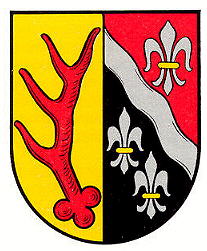Königsbach an der Weinstrasse: Difference between revisions
Jump to navigation
Jump to search
Knorrepoes (talk | contribs) m (Text replacement - "/Arms of " to "/Arms (crest) of ") |
Knorrepoes (talk | contribs) m (Text replacement - "{{media}}" to " {{de1}} {{media1}}") |
||
| Line 24: | Line 24: | ||
The deer antler is taken from the arms of the Lords of Hirschhorn (which means deer antler), who ruled the village for many centuries as vassals for the Bishops of Speyer. The left half, with the bend and the fleur-de-lis is of unknown origin. The arms appeared already on the seal of 1590, but with the deer antler in the right half. The above arms appeared in the 18<sup>th</sup> century and did not change afterwards. | The deer antler is taken from the arms of the Lords of Hirschhorn (which means deer antler), who ruled the village for many centuries as vassals for the Bishops of Speyer. The left half, with the bend and the fleur-de-lis is of unknown origin. The arms appeared already on the seal of 1590, but with the deer antler in the right half. The above arms appeared in the 18<sup>th</sup> century and did not change afterwards. | ||
{{ | |||
{{de1}} | |||
{{media1}} | |||
[[Civic Heraldry Literature - Germany|'''Literature''']]: Debus, 1988. | [[Civic Heraldry Literature - Germany|'''Literature''']]: Debus, 1988. | ||
Revision as of 11:34, 26 December 2022
This page is part of the German heraldry portal |
Heraldry of the World |
|
German heraldry:
|
Selected collector's items from Germany:
|
KÖNIGSBACH AN DER WEINSTRASSE
State : Rheinland-Pfalz
Urban district (Stadtkreis) : Neustadt an der Weinstrasse
Incorporated into : 1969 Neustadt an der Weinstrasse
| German | |
| English | an der Weinstrasse No blazon/translation known. Please click here to send your (heraldic !) blazon or translation |
Origin/meaning
The arms were granted on May 15, 1845.
The deer antler is taken from the arms of the Lords of Hirschhorn (which means deer antler), who ruled the village for many centuries as vassals for the Bishops of Speyer. The left half, with the bend and the fleur-de-lis is of unknown origin. The arms appeared already on the seal of 1590, but with the deer antler in the right half. The above arms appeared in the 18th century and did not change afterwards.
Literature: Debus, 1988.


